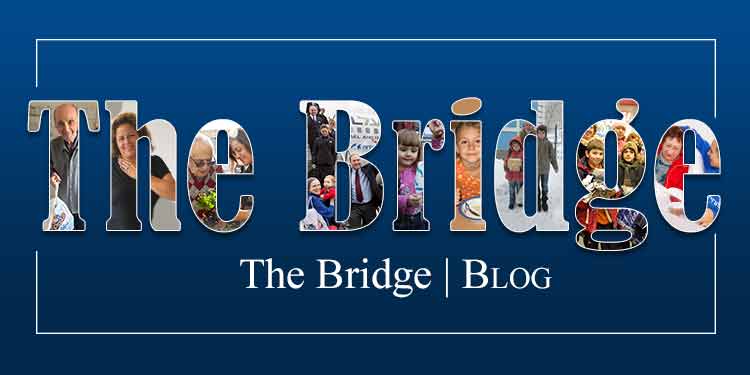Launching Isaiah 58
The Fellowship | July 31, 2015

Read this section from The Bridge Builder, a compelling biography about the life and continuing legacy of Rabbi Eckstein.
When Eckstein started out, he had been an advocate for Israel and a teacher of Judaism to evangelicals. Now he sat at the controls of unanticipated wealth. Soviet immigration was sufficiently funded. What would he do with the extra money? The answer came to him in Chicago, while he was leading Yom Kippur prayers at the Park synagogue.
The service includes God’s rhetorical question to the Jews in the book of Isaiah: “Ye fast not this day so as to make your voice be heard on high. Is such the fast that I have chosen?” God provides his own answer with another question: “Is it not to give your bread to the hungry, and bring the poor that are cast out to your house, and when you see the naked, cover him?”
Eckstein had read this passage every year of his adult life, but this time it struck a chord. “I realized that there were a lot of elderly Jews who wouldn’t be able or willing to leave for Israel,” he says. “It was pretty simple. They needed help, but there was no one taking care of them.”
. . . Eckstein’s reasons for starting Isaiah 58 went beyond his desire to help the Jews of Russia. The project would keep him in the evangelical public eye. It would broaden the rationale for donating to The Fellowship, from participating in history through aliyah to assuming a “brother’s keeper” obligation toward impoverished Jews. And it would enable him to strike a strategic alliance with the mainstream American Jewish community, via one of its most prestigious organizations, the Joint Distribution Committee.
“It became clear to me that Christians would respond generously to what they, and I, saw to be the biblical injunction ‘Comfort ye, comfort ye my people.’ I knew the money would be forthcoming but I needed a structure to give it away. The Joint had that.”
The JDC, also known as the Joint, was founded in 1914 as a welfare agency for the world’s poorest Jews. Throughout the pogroms and the devastation of World War I, it provided aid in Russia, Central and Eastern Europe, and the newly settled area of Palestine. After Hitler came to power, it removed German Jews to boarding schools in Palestine. During the Cold War, the JDC was active in trying to aid Jews behind the Iron Curtain, and helped impoverished communities in Iran, Morocco, and other Islamic countries. Since the fall of the USSR, it had been dispensing aid to the poor and elderly – the same community The Fellowship had singled out under Isaiah 58.
The JDC was interested in Eckstein’s activities, which were complementary. But its directors had concerns about him and his organization. He was still an outlier in the philanthropic Jewish community. The mainstream Hadassah Magazine refused to run Fellowship ads. The head of the Jewish Agency for Israel, Avraham Burg, declined to be photographed with him. Eckstein was invited to a JDC board meeting, and he was aware that he would be facing a skeptical audience.
“He came to tell us that evangelical Christians were our friends and potential partners,” says Alan Gill, the CEO of the Joint. “There was a lot of trepidation among the staff and the lay leadership. People didn’t know what was behind it. Why was a rabbi doing this? A rabbi advocating for evangelicals was confusing.”
Eckstein delivered a bravura performance, assuring the assembled members of the establishment that he and they were on the same side. “He challenged us at that meeting, as a major Jewish organization, to open a new chapter in our relations with the evangelical world,” Gill says. “He was there, he said, to help us get past our fear of the unknown. His message was: Let me help you get in sync with today instead of yesterday. As he spoke, you could sense the room tip.”
A partnership with The Fellowship was a radical change for the JDC, which partnered with governments but had never worked with a non-‹Jewish organization. The JDC did due diligence and The Fellowship came up clean. “People were impressed by Yechiel’s work in the former Soviet Union,” says Gill. “There was no glory there, just helping a lot of elderly people.” The JDC decided to go ahead with a joint venture.
It was a big moment for Eckstein and The Fellowship – the first time a major American Jewish organization embraced his mission and offered him a leadership position, first on its board of directors and later on the executive board. Over time, Eckstein channeled more than $100 million of Fellowship donations to impoverished Jews in the former Soviet Union, the Balkans, and Ethiopia through the Joint Distribution Committee.
“In the matrix of Jewish life, Yechiel is absolutely central,” says Gill. “To me, it’s just stunning that these Christians care about needy Jews. He’s the one who awakened that concern.”
Learn more about the legacy of Rabbi Eckstein or about his biography.
You can order the hardcover or Kindle copy of The Bridge Builder on Amazon.
